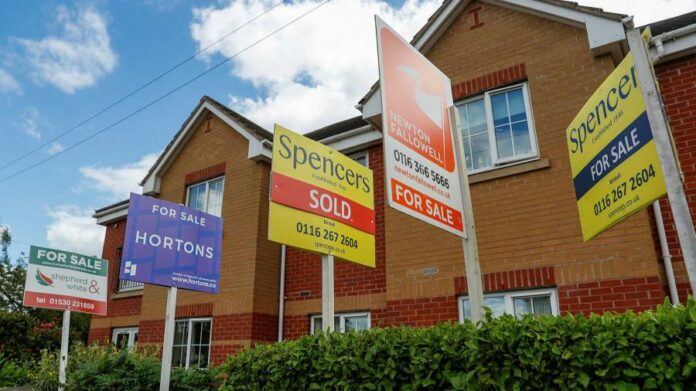UK house prices updates
Sign up to myFT Daily Digest to be the first to know about UK house prices news.
Annual UK house price growth cooled in July as the rush to move home before the stamp duty holiday ended began to fade, but it remained in double digits as demand from buyers continued.
The Nationwide house price index slipped to 10.5 per cent in July from 13.4 per cent the previous month, while seasonally adjusted prices fell 0.5 per cent month on month, bringing the average price of a home to £244,229.
The fall followed a surge in activity in June, as buyers rushed to take advantage of a tax break on property transactions, creating the biggest annual jump in the index since 2004.
The stamp duty holiday, which removed the purchase tax on the first £500,000 of a property’s value, will now taper before ending completely in October, removing a big driver of housing transactions in a frenzied year that has pushed the price of homes close to a record high relative to incomes.
Economists are divided as to whether the housing boom can continue. Martin Beck, senior economic adviser at EY Item Club, said accumulated savings and enduring changes to housing preferences, following a post-pandemic rush for homes with more space and gardens, would keep prices high after the stamp duty break tails off.
“The odds of a significant correction in house prices anytime soon looks small,” he said.
But Gabriella Dickens, senior UK economist at Pantheon Macroeconomics, said “house price growth has probably now peaked”.
“The larger than expected slowdown probably marks the start of a sustained deceleration in house price growth between now and the end of the year,” she added.
The Nationwide figures showed that “savings” from the tax break were dwarfed by an increase in the price of homes. The cost of a typical UK property increased by £24,500 between July 2020 and June 2021, while the stamp duty saving was £1,900.
Data from HM Land Registry highlighted that higher priced properties drove activity during the pandemic. The number of transactions involving builds of £500,000 or higher increased 37 per cent in the year to March 2021, compared with 2 per cent for all properties.
Guy Harrington, chief executive of residential lender Glenhawk, said the market had overheated “to the point where far too many have been priced out”. He warned that falls in income and credit availability meant a pricing shock could be “around the corner”.
“It is astonishing just how far removed from reality the last year has been,” he said.
Robert Gardner, Nationwide’s chief economist, said underlying demand was likely to “remain solid” in the near term, because of low borrowing costs, and a lack of housing supply in the market.
The potential for rising unemployment and the end of the stamp duty holiday would likely soften prices, he added, but sustained demand meant any falls were far from assured.
“As we look toward the end of the year, the outlook is harder to foresee.”
Credit: Source link









